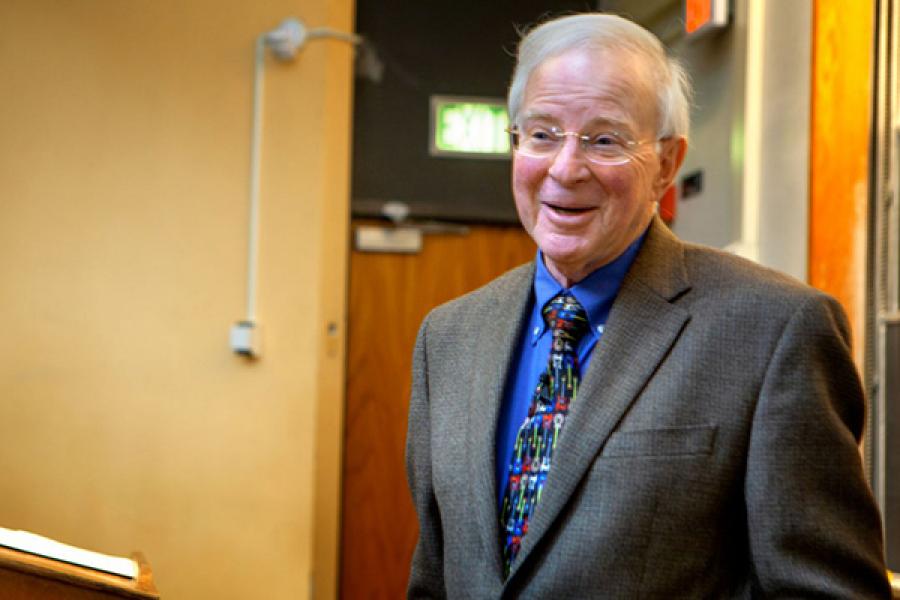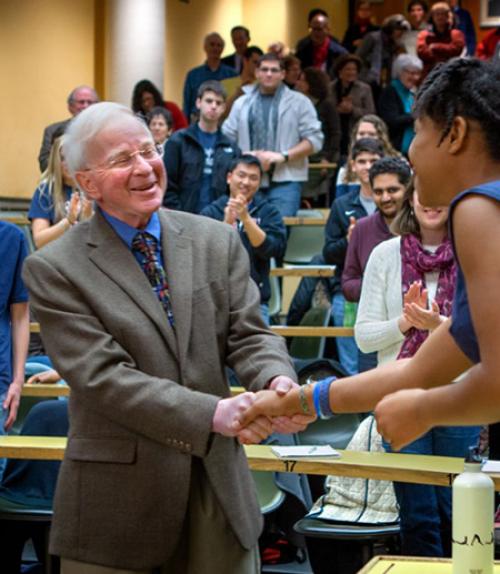Richard “Dick” Polenberg, the Marie Underhill Noll Professor of History Emeritus, died Nov. 26 in Ithaca. He was 83.
Polenberg, a foremost scholar of American history, taught at Cornell from 1966 through his retirement in 2012. He served as department chair from 1977-80, taught memorable large lecture courses (including his popular class on modern U.S. history, which reliably filled Bailey Hall), and trained and mentored countless graduate students over the decades.
“Almost from the day I arrived at Cornell in 1972, Dick served as my model for the perfect blend of teacher and scholar,” said R. Laurence Moore, the Howard A. Newman Professor of American Studies and History Emeritus and a close friend of Polenberg. “Thousands of Cornell students took his courses, and many others read his books. But what I will remember most about Dick are personal traits – his gentleness, his integrity, his unending compassion for anyone who needed his help.”
“Dick Polenberg was one of the greatest among a remarkable group of historians of his generation,” said Barry Strauss, the Bryce and Edith M. Bowmar Professor in Humanistic Studies in the College of Arts and Sciences. “He was a wonderful teacher, scholar and colleague. He was a wise and humane mentor, as insightful as he was generous. Those of us who knew him will always count ourselves as fortunate.”
Polenberg, who received his B.A. from Brooklyn College in 1959 and his master’s (1959) and Ph.D. (1964) from Columbia University, first came to campus as a graduate student to conduct research and began teaching at Cornell as an assistant professor in 1966. He became a full professor in 1970, was named the Goldwin Smith Professor of American History in 1986 and the Marie Underhill Noll Professor of History in 2007.
Polenberg’s scholarly career covered a range of topics, including President Franklin D. Roosevelt’s New Deal policies, the social history of the United States in the modern era, and constitutional and legal history. He authored several books, including “One Nation Divisible: Class, Race and Ethnicity in the U.S. Since 1938,” “Fighting Faiths: The Abrams Case, the Supreme Court and Free Speech” (which received the American Bar Association‘s Silver Gavel Award) and edited an edition of the records of the 1954 hearing assessing the loyalty of theoretical physicist J. Robert Oppenheimer.
1201_polenberg3_600x400px.jpg
Polenberg was “a legendary master storyteller,” said Margaret Washington, the Marie Underhill Noll Professor of American History. “I knew him as a colleague and as a friend of intuitive sagacity, gentle demeanor and firm social justice convictions … devoted to historically conveying the human condition.
“I valued Dick’s integrity, directness, judgment and amazing knowledge, as long as we avoided baseball – he adored the Mets and I bleed Dodger blue,” Washington said, adding that he “will be best remembered and loved for passing on his attained wisdom to others.”
In addition to his memorable 20th century American history lectures in front of large Bailey Hall classes, he also excelled in teaching more intimate small seminars – sometimes in the living room of his Collegetown home. In more recent years, he had also included teaching classes on American roots music and the blues, another of his lifelong interests.
Polenberg was “known and treasured by his students and colleagues for his wonderful conversation and humor, his extraordinary high standards of scholarship, and his sheer example as a person who loved Cornell and continually translated that commitment into the highest of personal and scholarly qualities,” said Walter LaFeber, professor of history emeritus.
Polenberg was a recipient of the Clark Distinguished Teaching Award and was named a Stephen H. Weiss Presidential Fellow, among other accolades. In 1988-89 he served as a Fulbright Visiting Professor at the Hebrew University of Jerusalem.
Polenberg was honored by one former student with the establishment of the history department’s Elizabeth L. Grover ’75 Chair’s Discretionary fund in Honor of Professor Richard Polenberg (also known as the Polenberg Fund for Undergraduate Education), which brings outside speakers to undergraduate history classes, and funds field trips and movie screenings.
Following his retirement, Polenberg taught for several years at the Auburn Correctional Facility as part of the Cornell Prison Education Program. He also published “Hear My Sad Story: The True Tales That Inspired ‘Stagolee,’ ‘John Henry’ and Other Traditional American Folk Songs” (Cornell University Press, 2016).
In 2011, Polenberg delivered a “last lecture” as part of the Mortar Board Senior Honor Society‘s Last Lecture series and reflected on his career. During that talk, Polenberg recalled that when he came to Cornell, “it never occurred to me I would spend the rest of my life here and would end up teaching more than 25,000 students. But it was the best thing that could have happened to me. I‘ve always believed the job I have here is the finest job any historian could ever have.”
Polenberg is survived by his wife of 33 years, Joni Spielholtz; five children; and seven grandchildren.
A private funeral was held Nov. 30. Shiva was observed virtually by the family on Nov. 30 and will be observed again at 7:30 p.m. Dec. 2 – and any of Polenberg’s friends, students or colleagues are welcome to attend. For more information and a Zoom link, contact Rabbi Rachel Safman.
Read the story in the Cornell Chronicle.





